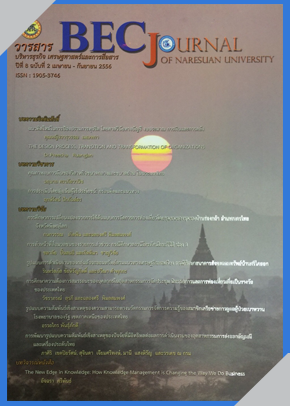รูปแบบความสัมพันธ์เชิงสาเหตุของความสามารถทางนวัตกรรมการจัดการความรู้ของสมาชิกเครือข่ายการดูแลผู้ป่วยเบาหวาน โรงพยาบาลของรัฐ เขตภาคเหนือของประเทศไทย
Main Article Content
บทคัดย่อ
การวิจัยครั้งนี้มีวัตถุประสงค คือ 1) เพื่อศึกษาลักษณะของความสามารถทางนวัตกรรมการจัดการความรู และพัฒนารูปแบบความสัมพันธเชิงสาเหตุระหวางปจจัยทุนทางสังคม การแลกเปลี่ยนความรูและศักยภาพการ เรียนรูที่มีผลตอความสามารถทางนวัตกรรมการจัดการความรู ของสมาชิกเครือขายการดูแลผูปวยเบาหวาน โรงพยาบาลของรัฐ เขตภาคเหนือของประเทศไทย 2) ตรวจสอบความสอดคลองระหวางรูปแบบสมมติฐานกับ ขอมูลเชิงประจักษ กลุมตัวอยางของการวิจัย คือ บุคลากรวิชาชีพสุขภาพดานการดูแลผูปวยเบาหวาน ที่สังกัดโรงพยาบาล ของรัฐ ในเขตภาคเหนือของประเทศไทย โดยวิธีการสุมตัวอยางแบบงาย และเลือกตัวอยางตามลําดับรายชื่อของ แตละจังหวัด ไดแบบสอบถามตอบกลับที่สมบูรณ จํานวน 214 คน ผลการวิจัยพบวา 1) ปจจัยทุกตัวในโมเดลความสัมพันธเชิงสาเหตุของความสามารถทางนวัตกรรมการ จัดการความรูอยูในระดับสูง 2) ผลการตรวจสอบความสอดคลองของโมเดลการวิเคราะหองคประกอบเชิงยืนยัน ของปจจัยที่ศึกษาในงานวิจัยครั้งนี้ และโมเดลความสัมพันธเชิงสาเหตุที่ผูวิจัยพัฒนาขึ้น มีความสอดคลองกับ ขอมูลประจักษตามเกณฑดัชนีชี้วัดความสอดคลอง
Causal Model of Innovation Capability of Members of the Knowledge Management Network for Caring Patients with Diabetes at Public Hospitals in the Northern Region of Thailand
The aims of this research were 1) to study the characteristics of knowledge management (KM) innovation capability and develop a causal relationship model among social capital factors, knowledge sharing, and learning capacity that affected KM innovation capability of the members of the network for caring patients with diabetes in public hospitals in the northern region of Thailand, and 2) to examine the concordance between a hypothetical model and a real condition. The samples of this study, acquired from each province through the simple random sampling technique, were professional health personnel involved in caring patients with diabetes in public hospitals in the northern region of Thailand. The samples were selected in the order of the provinces. 214 completed questionnaires were received. The findings of the study revealed that 1) all factors of the causal relationship model on KM innovation capability model were at a high level. 2) Regarding the analysis of linear structure of the causal relationship model, it was found that the constructed model was in accordance with the empirical data.


